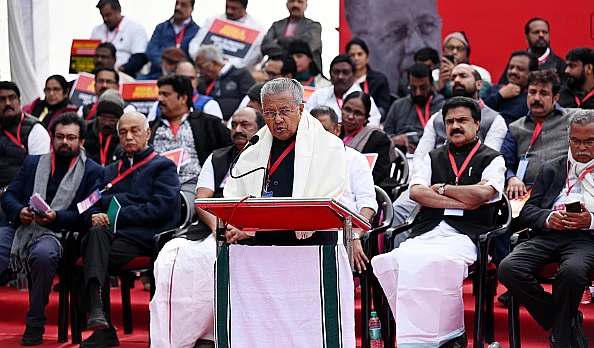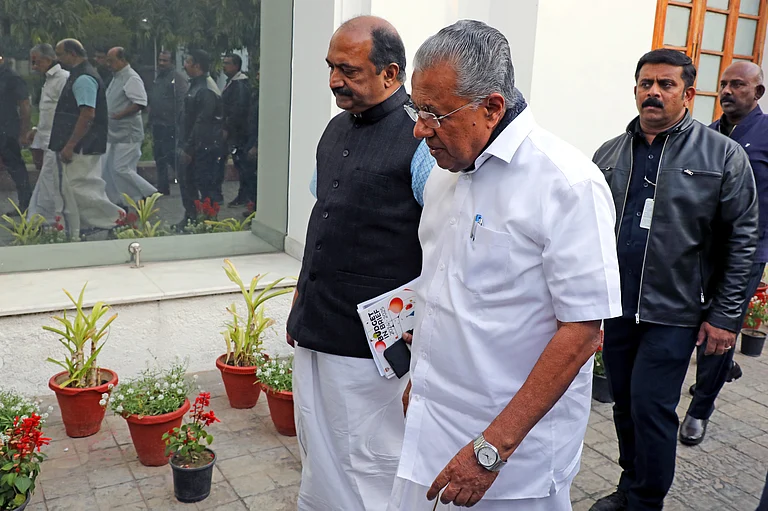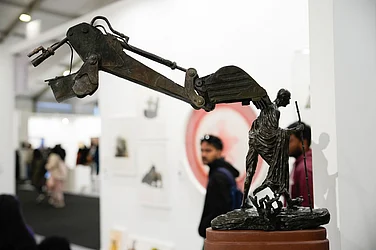Kerala has several reasons to protest--ranging from the cut in tax share to the limiting of off-budget borrowings and the unmet GST compensation, to hurting people’s self-respect by branding the products given through central schemes. In the protest held in Delhi on February 8, Kerala Chief Minister Pinarayi Vijayan asserted that labelling a welfare scheme as a particular entity's benevolence, even if it emanates from the government, pertains to a matter of self-respect. He contended that branding a scheme as a government gift should not subject beneficiaries to potential embarrassment, as individuals benefitting from a program should not be stigmatised by attributing its existence solely to governmental generosity.
Speaking at the protest held in New Delhi, Chief Minister Pinarayi Vijayan referred to the government’s popular project of LIFE Mission housing scheme for the poor. So far, the state has completed the construction of 3,74,508 houses spending a total of Rs. 17,104.87 crores. The Union Government has borne only a 12.17 per cent share of this expense. The rest--87.83 per cent has been borne by the government of Kerala and the LSGIs in Kerala. “Even in this project, they are adamant that they should be named. If not, they say that they will withhold even their minuscule share. Just imagine the pitiable scene of a poor man's house bearing the mark that it is somebody else's gift. To put such a mark amounts to an insult on the self-esteem of the concerned family and would result in a shameful stigma that they will have to suffer even after generations. We would like to make it very clear that the state of Kerala will in no way allow it to happen,” he categorically said in the public address in New Delhi.
K N Balagopal, the Finance Minister of Kerala stated in the Legislative Assembly while presenting the State budget on February 5, that the Union Government is pushing the state into the worst financial crisis in its history. Balagopal said that Kerala receives only Rs 21 from every Rs 100 collected as tax while Uttar Pradesh gets Rs 46, and Bihar gets Rs 70. In the divisible pool of tax collected by the Centre, which is to be devolved among the states, 3.87 per cent was Kerala’s share during the 10th Finance Commission period. This has come down to 2.5 per cent in the 14th Finance Commission and further down to 1.925 per cent in the 15th Finance Commission. It is now a well-known fact that Kerala has lost tens of thousands of crores as a result of this. Everyone knows that Kerala is getting punished for its developmental achievements. The people of Kerala are being punished for their high per capita income and controlled population growth,” said the minister in the assembly.
The total revenue receipt of a state is the combination of state’s own revenue and the transfers from the Union Government. According to the PRS Legislative research report, the national average for the State’s own revenue and Centre’s transfer is 57 per cent and 43 per cent respectively for the year 2023-24. However, there is an apparent anomaly in the transfer of share for a few states that causes consistent revenue deficit despite having an impressive scale of revenue generation by its own. "If we look at the actual figures for the year 2023-24 till November we can see that Kerala’s own revenue is 82 per cent and the transfer from the Centre is just 18 per cent. This is a gross disparity which is precisely the reason for the fiscal crisis that the State has been going through,” says Gopakumar Mukundan, an adjunct faculty at the Centre for Socio Economic and Environmental Studies.
According to PRS Legislative research report, seven states have persistently reported revenue deficit since 2015-16, namely Kerala, Andhra Pradesh, Punjab, Rajasthan, Haryana, Tamil Nadu and West Bengal. "A comparison with other states reveals that these seven states on average had lower revenue as percentage of GSDP. Central transfers as a percentage of GSDP were lower than the national average for Haryana, Kerala, Punjab and Tamil Nadu. Per capita GSDP of Haryana, Kerala and Tamil Nadu is significantly higher than India’s per capita GDP," states the report.
The Chief Minister Pinarayi Vijayan alleged that the states could see a rapid rise in the Union's revenue earned through Cess and Surcharge. They need not be shared with the states as they do not come under the divisible pool. "There has been a rise of 133 per cent in collection of major Cess and Surcharge levied by the Union Government on various products between 2017-18 and 2022-23. It went up from Rs. 2,18,553 crore to Rs. 5,10,549 crore during that five year period. Despite amassing all this revenue, not a single penny from it is shared with the states,” he said.
According to the government the state’s fiscal status is also crunched by limiting the scope of borrowings and the long pending due of the GST compensation. The Economic Review of 2024 released by the State Planning Board of Kerala affirms that recent policy initiatives of the Union Government pose a threat to the fiscal independence of the State in general. "The annual loss due to discontinuation of GST compensation is around Rs 12,000 crores per year. The shareable tax entitled to Kerala has been consistently falling. Without consulting the states, the Union Government increased Cess and surcharges and such additional levies are not shared with the states,” states the Economic Review report.
According to K N Balagopal, the Finance Minister of Kerala, the borrowing entitlement as per the Centre’s own criteria has been denied during the fiscal year 22. "As per the Centre’s own guidelines, Kerala’s eligible borrowing limit is Rs 39,626 crores. The State Budget was prepared considering the same. But Kerala has been allowed to borrow only Rs 28,830 crores till now. The borrowing limit was cut short during mid-fiscal without any prior notice, based on improper calculation of public account balance," he stated in the Assembly during the presentation of the State Budget.
Declaring support for Kerala’s strike in Delhi against the policies of the Union Government, Tamil Nadu Chief Minister M K Stalin vehemently criticised the Centre for its allegedly authoritarian fiscal policies. “For the year 2023-24, the Union Government has fixed the GSDP growth for calculating the net borrowing ceiling at a mere 8 per cent, despite the State consistently achieving around 15 per cent nominal growth in the last two years. This has resulted in a loss of Rs 6000 crores in borrowing space in the current year,” he stated in the letter sent to the Kerala Chief Minister extending support. He alleged that a revenue shortfall of Rs 20,000 crores per annum is being faced by the government in comparison to the pre-GST regime and the Union has been refusing to extend the compensation regime. "The intent seems to be aimed at crippling state's ability to raise resources and fund for the crucial developmental initiatives according to the state’s priorities,” he questioned the motive of the Union Government in the letter sent to Pinarayi Vijayan.
In a recent investigative report, The Reporters' Collective alleged that the Prime Minister has made an unconstitutional attempt to reduce the share of Central taxes to be delivered to the states. The 14th Finance Commission recommended that states should get 42 per cent of the share of central taxes, up from the 33 per cent it had been receiving till then. The Reporters' Collective alleged that the Prime Minister and his finance ministry wanted to keep the states’ share of the taxes down at 33 per cent.
According to the constitutional provisions, a government cannot negotiate and amend the recommendations of the Finance Commission. The government can either accept or appoint a new commission. According to The Reporters' Collective, the Union Government tried off-record parleys to get the chairman of the Finance Commission, YV Reddy, to pare down his recommendations on the revenue share. It was in breach of Constitutional propriety.


























